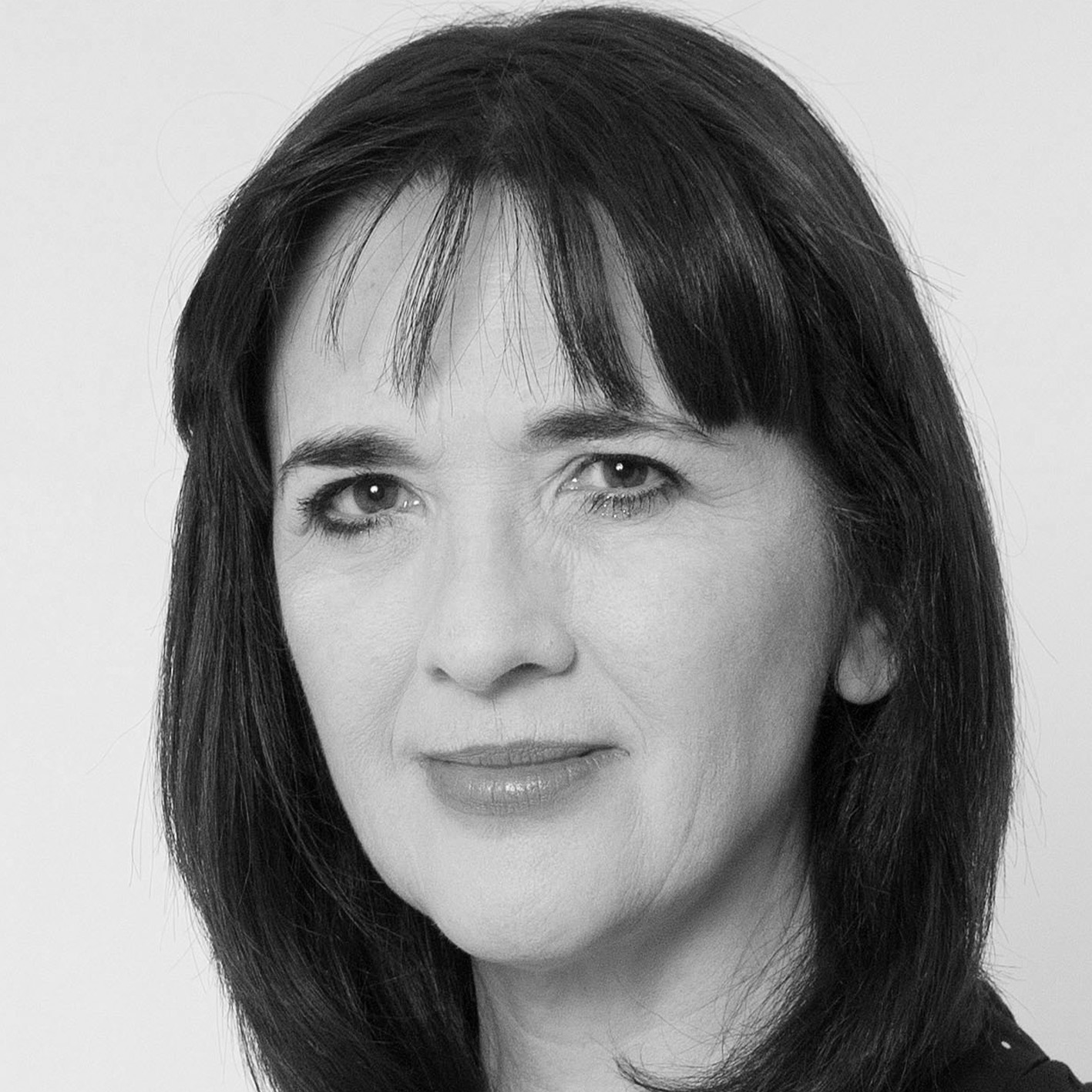Location: the Balearic island of Mallorca, near the picturesque town of Sant Llorenç des Cardassar. A sun-drenched villa decked out with beanbags, a firepit, an infinity pool and an open kitchen emblazoned with the legend: “Eat, sleep, crack on, repeat.”
A group of twentysomething humans in swimming costumes – six male; six female – sternly evaluate each other’s sexual desirability in the blazing sun. In an introductory link, one male describes his perfect match: “She’s wifey but she’s sexy.” A female does likewise: “Big arms, big teeth, but they have to have the chat.” One of the men assesses himself: “I’d give myself a 9.5. For it to be a 10, I’d have to have my trousers off.” At some point, a sultry female voiceover purrs: “Strap yourself in for a summer to remember.”
Love Island is back and it has a big anniversary. It’s the 10th series of the ITV2 reality dating show juggernaut. Last week’s launch episode of the new series, described above, attracted 1.4 million viewers. These are better viewing figures than for the second series of Love Island: All Stars – the Love Island spin-off featuring returning Islanders – which aired earlier this year, but they’re still nowhere near the heights of the 2019 series finale, won by Amber Gill and Greg O’Shea, and watched by an average of more than 3.6 million viewers.
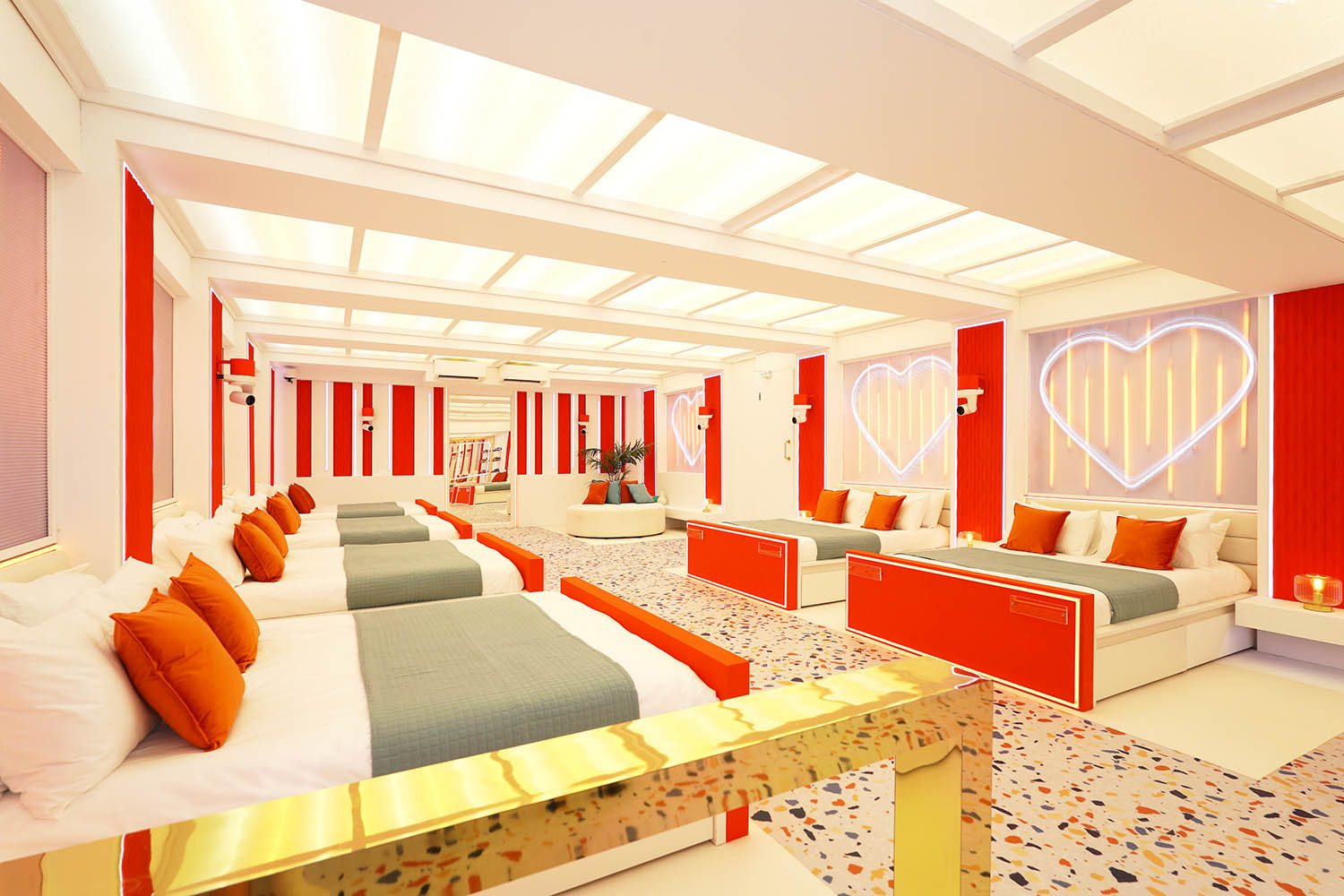
Eat, sleep, crack on, repeat: the Love Island villa
This was during the imperial period of Love Island: the years when its cultural clout was all-pervasive. In 2018, an infamous statistic suggested that twice as many young people applied to appear on Love Island – about 85,000 – as applied for an Oxbridge place. In 2021, ITV made a reported £73m from Love Island brand links alone.
Even now, celebrity fans include everyone from Liam Gallagher to US model Chrissy Teigen and actor Margot Robbie. The show is estimated to have been streamed more than two billion times and counting. The many advertising breaks remain sought-after and eye-wateringly expensive.
But a couple of days into the new series, it is hard to avoid the sense that the Love Island crown is slipping. That the sheen is coming off the dental veneers, the water bottles are being drained, the firepit is going out.
A trailer for this series had Love Island presenter Maya Jama grandly demanding more drama. It is rumoured that the show plans to walk back the rule against broadcasting images of sexual activity between contestants, which came in as a duty of care measure along with the two-drink-a-night limit.
A sex-positive move, or an act of seedy ratings desperation? And what of the show itself? A decade on, is it time for a cultural pause to acknowledge both the quintessential Britishness and intrinsic corporateness of Love Island?
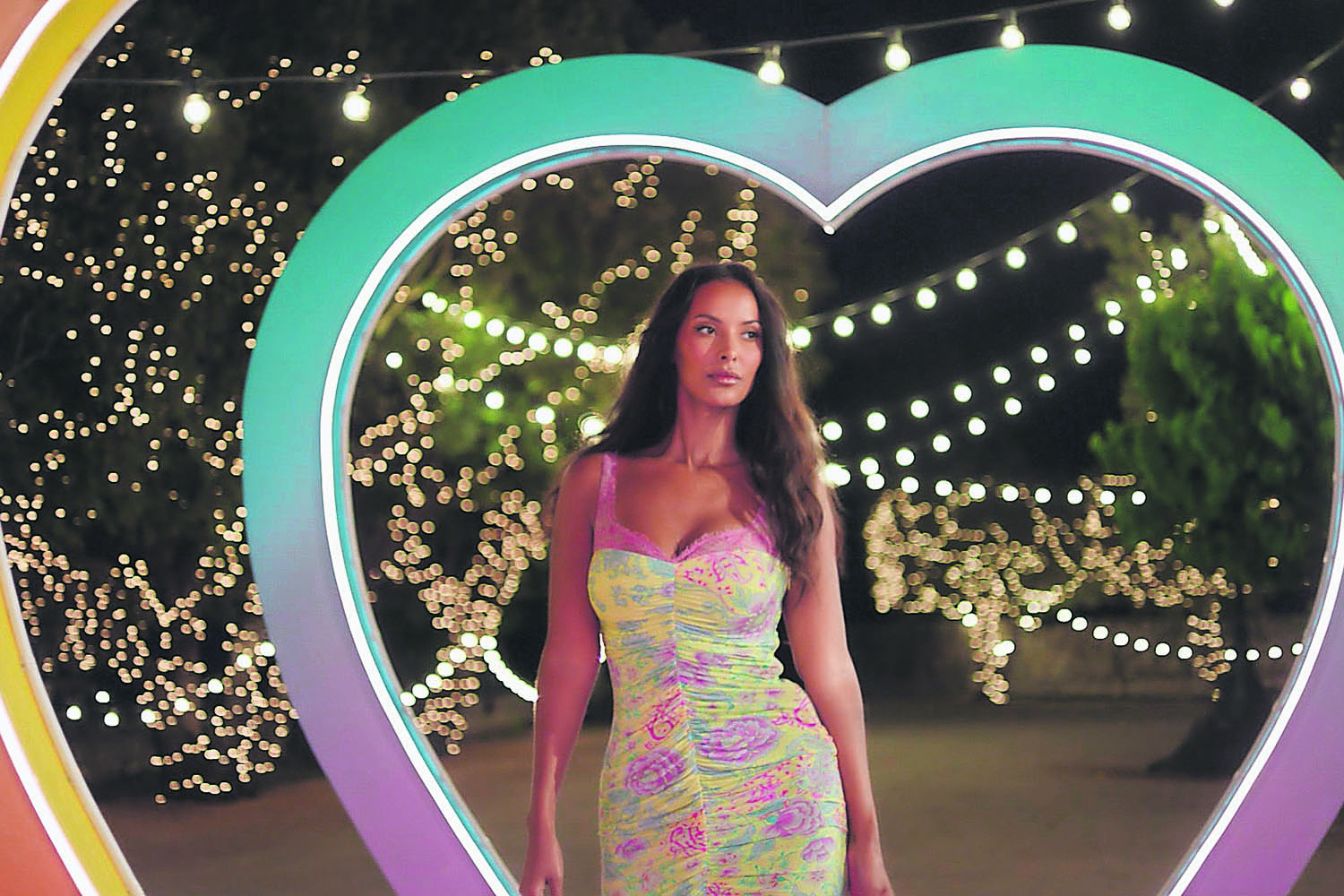
Queen of hearts: Maya Jama has hosted Love Island since 2023
To start with, and to be pedantic, this isn’t the 10th anniversary; it’s the 20th. An earlier version of the show, Celebrity Love Island, aired in 2005, hosted by Patrick Kielty and Kelly Brook, and featuring Calum Best, Abi Titmuss and Jayne Middlemiss among the Islanders. Even in this nascent form, the show was eventful, to put it mildly, full of crushes, trysts, rebuffs and boozy tempestuous meltdowns.
I interviewed Middlemiss in the aftermath of Celebrity Love Island and she said: “Rejection was a major fear and I faced it on national telly. I cried 27 times in 35 days on the island. I came home and my best friend said to me: ‘You used that as therapy didn’t you?’” Middlemiss added that, as soon as she got off the island: “It was like: the soap opera’s over, this is reality. There are more than six men in the world and thank the Lord for that.”
Newsletters
Choose the newsletters you want to receive
View more
For information about how The Observer protects your data, read our Privacy Policy
It was the rebooted 2015 model of Love Island that ignited the public imagination. Though, some will remember, back in the early series, it was more laid-back, more rough and ready, more, dare we say, authentic. Islanders would openly smoke (in 2017, there were more public complaints to Ofcom about the smoking on Love Island than the sex).
They would sit around a table and eat together (these days, they are generally herded out of sight as if there was something unsightly about nutrition).
These were also the days of heightened sexual content, not always graphically shown, but still to the detriment of Islanders.
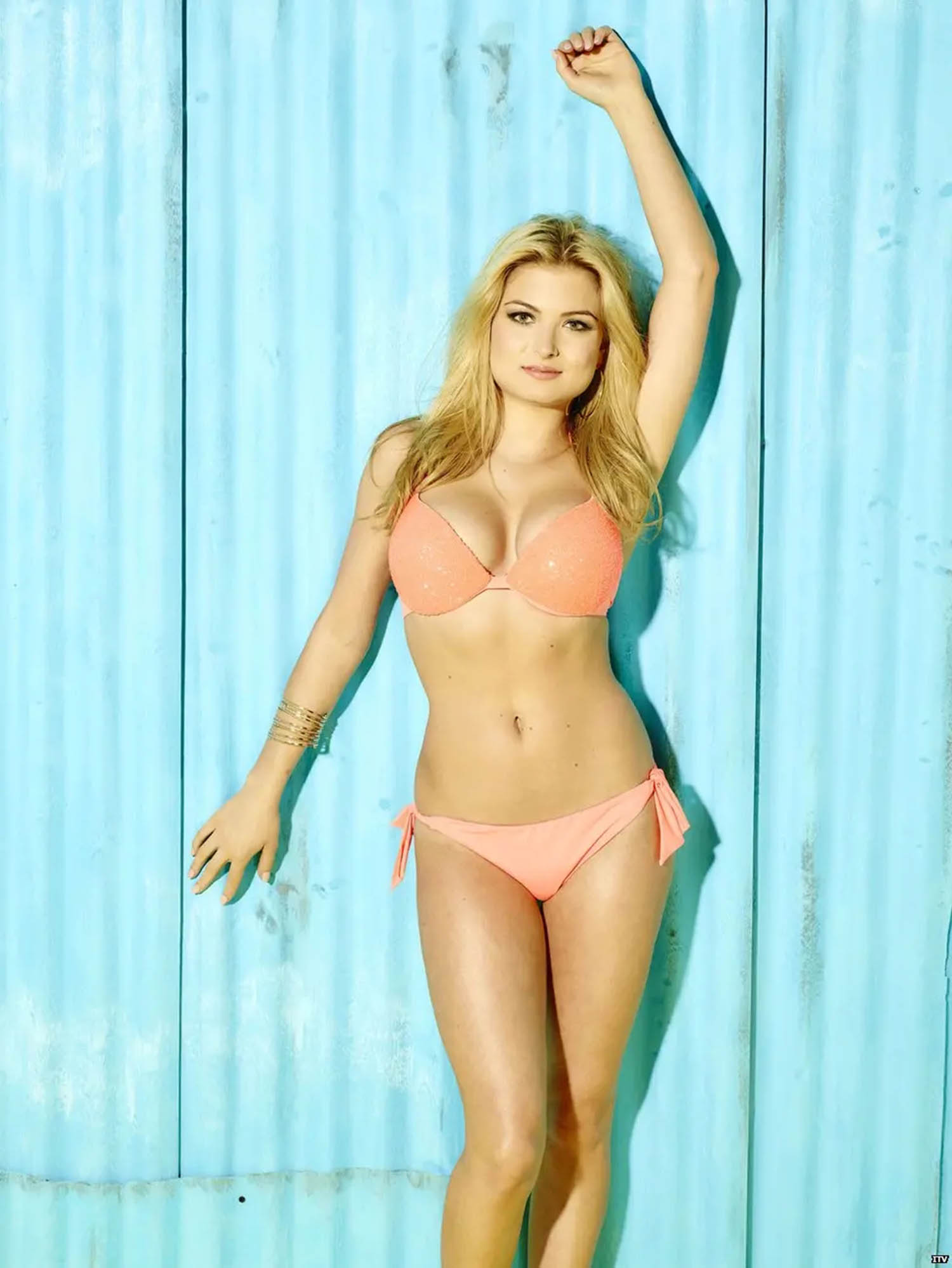
Zara Holland had her Miss GB title stripped from her after having sex on the show in 2016
Appearing on the second series in 2016, Zara Holland was viciously slut-shamed for a sexual encounter and ended up losing her Miss Great Britain title.
As time has gone on, bar some changes and “twists” – format tweaks, shall we say – the formula, the iconography of Love Island, has become as fixed as a fake smile. The villa. The nubile Islanders. The bonds. The drama. The tears. Plus, the tinny, hyper-bland muzak – weirdly only ever heard on Love Island and spin-off reality shows – that has become its own genre (affirmation pop?). Narrator Iain Stirling’s voiceover as he heroically attempts to appear remotely interested in the fortunes of the latest batch of amorously inclined Islanders.
There remains the fabled Love Island “look”: big hair, pillow lips and fake boobs for the women; gym-honed, industrially waxed musculature for the men. But, worryingly, very young foreheads look increasingly rigid with Botox. Most Islanders now sport fake tans so baked in you fear removing them might imperil vital organs. Then there is the ChatGPT-level flirting and leaden “bants” that have long since made the show feel scripted even when it isn’t.
The now routine island happenings: sending in “bombshells” (new Islanders) to shake things up (translation: destroy established couples).
Middle-class males in particular seem sexually repellent to Islanders
Middle-class males in particular seem sexually repellent to Islanders
Dispatching Islanders to the notorious second villa, Casa Amor, as a “test” (read: encouraging them to be unfaithful). Sending couples to the “hideaway” for “privacy” (encouraging them to have sex). This is how Love Island got a reputation for being an Instagram-themed meat market, if not a veritable 21st-century Sodom and Gomorrah.
Who isn’t aware by now that the classic Love Island “journey” wouldn’t be complete without the savage recouplings, or expulsions by public vote around the near-mythical firepit. Followed by the defeated clank of the hot-pink branded suitcase as the banished wheel themselves out of the villa, back to Blighty and dreary anonymity.
Or, if they’re lucky, a punched-up social media profile and offers of lucrative brand endorsements.
Over the years, a genuine darkness attached itself to the confected paradise. Three suicides have been connected to the show: two contestants, Mike Thalassitis and Sophie Gradon, and, in 2020, the original 2015 Love Island presenter Caroline Flack, who stepped down from the role in 2019 (replaced first by Laura Whitmore, then Jama). In a recent celebratory documentary marking the show’s 10th anniversary, Flack was shown only fleetingly in the background. (Other controversies including the recurring conversation about race – how black Islanders and other people of colour tend to get overlooked or voted off early – or issues connected to mental health were also inevitably airbrushed out.)
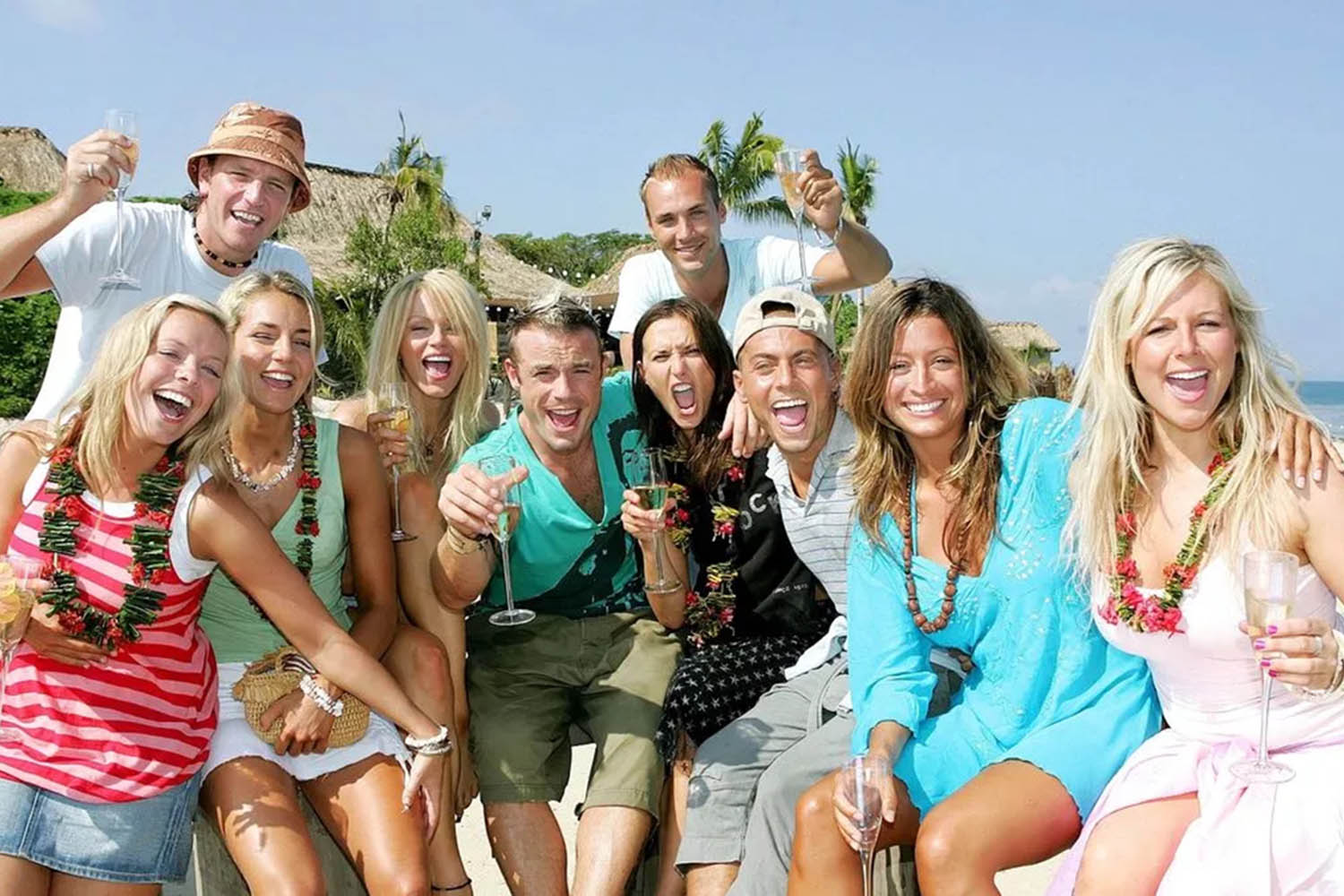
The cast of Celebrity Love Island, an earlier version of the show
On a commercial level, however, there is another problem that ITV bosses probably lose sleep over: there is now just too much Love Island for even the most ardent fan to consume. After all, there’s the main show. The podcast. The weekly roundup (Love Island: After Sun). If there isn’t a Winter Love Island, there’s a Love Island: All Stars. The series has started to feel exhausted. (Winter Love Island especially proved to be a ratings disaster – in its own villa-vernacular, a flex too far.)
Love Island, however, has genuinely moved the cultural dial, transforming youth dynamics in Britain. In terms of television, reality dating shows have proliferated in its slipstream. Copyist series and revivals of old formats (Temptation Island, Too Hot to Handle). Social experiments (Married at First Sight). The good (gay dating shows I Kissed a Boy and I Kissed a Girl). The grubby (Ex on The Beach, which makes Love Island look like an EM Forster novel). The addictive (The Honesty Box, Cheat, Love Triangle). The patronising (the “midlife Love Island”, My Mum, Your Dad). From the US, there’s the likes of The Ultimatum and Love Is Blind (there is now a UK version of the latter, hosted by Emma and Matt Willis), though stateside, the emphasis is much more on relationships.
Away from the TV industry, out in the wild, Love Island’s influence continues to permeate. It has popularised a new vocabulary: “the ick” (going off somebody); “deeping it” (overthinking an issue); and “grafting” (putting some effort into forming an attachment).
That annoying thing of making the heart shape with your thumbs and fingers comes from Love Island. It has changed how people want to look, with a strict diktat of The Only Way Is Essex-level ultra-glamour for both sexes. It helped bring social media thundering into people’s living rooms – playing a significant part in establishing the online forum as a powerful watercooler force. Elsewhere, evidence suggests Love Island has changed dating etiquette (“A bit of me”, “My type on paper”, “Eggs in one basket”), setting a new template, harnessing throwaway “swipe right” Tinder culture and turbocharging it. Here, Love Island, the actual show, still cracks the whip. Regular viewers will be aware of the mid-series slumps, when Islander couples start flagging, showing signs of being more interested in laughs and companionship (oh, the humanity). At this point, producers presumably have a word.
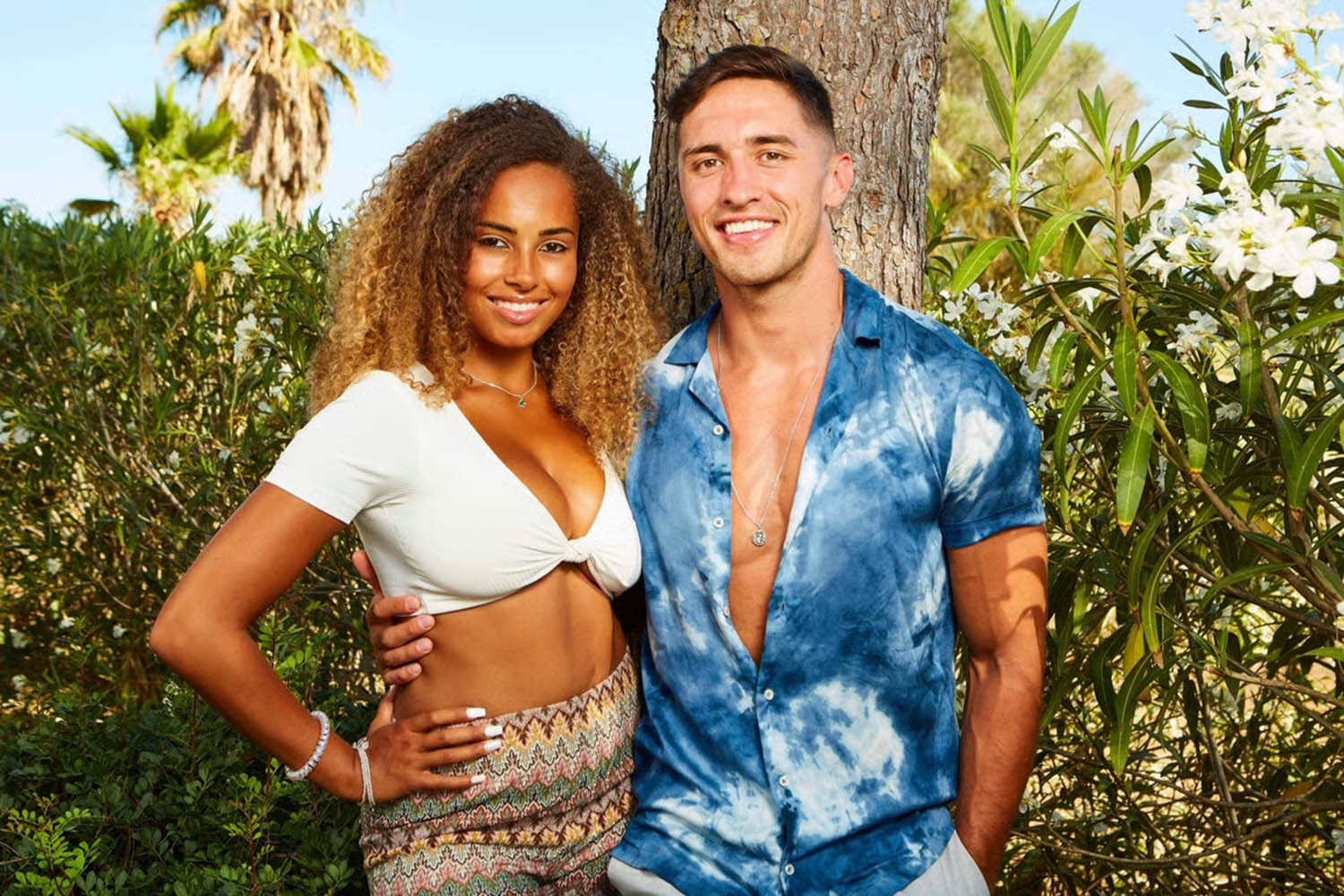
Amber Gill and Greg O’Shea won the fifth season of the show in 2019
Something has to explain why the Islanders are suddenly burbling to camera, panic in their eyes about how: “It’s not Friend Island”, before trudging back into the fray for more hard grafting.
As well as being determinedly apolitical (it predates both Donald Trump’s presidency and Brexit), there is also the fact that Love Island is imbued with that innate Britishness – for all the glamour and the drama, what is it if not the egg and chips of British TV? It somehow manages to retain this quality even as different versions continue to flood the globe: everywhere from Australia and the US to Nigeria and Albania. Moreover, the UK version of Love Island remains a working-class show with working-class rules.
It isn’t too hyperbolic to suggest the programme has set a new standard for how working-class young people are presented on TV.
Certainly, the middle classes don’t tend to do well on the show. Middle-class males in particular seem sexually repellent to Islanders – in an intriguing reversal of the real world, a posh education, a Jack Wills T-shirt and a Cornish surfer-boy haircut gets a chap precisely nowhere on Love Island.
Nor, to its credit, has the series become nepo-centric. There is the odd famous surname: Danny Dyer’s daughter; Michael Owen’s daughter; Ronan Keating’s son. However, the show has never made a habit of acknowledging in-real-life, off-island celebrity. It is too invested in building its own ecosystem of villa-reared stars.
Perhaps most alarmingly, Love Island has, it seems, changed how young people view work, the very shape of their ambition. While it didn’t create influencers, it certainly contributed to their rise, to the appeal and gentrification of the position. Influencers are hated by viewers because they’re not there for love, but to boost numbers of their followers. (Though, “being real”, as an islander might say, has always been relative.)
There still may be some innocents wandering into the villa, but the astonishing success of breakthrough Islanders (the likes of Molly-Mae Hague, Maura Higgins and Olivia Attwood), and the potential to earn millions has been noted.
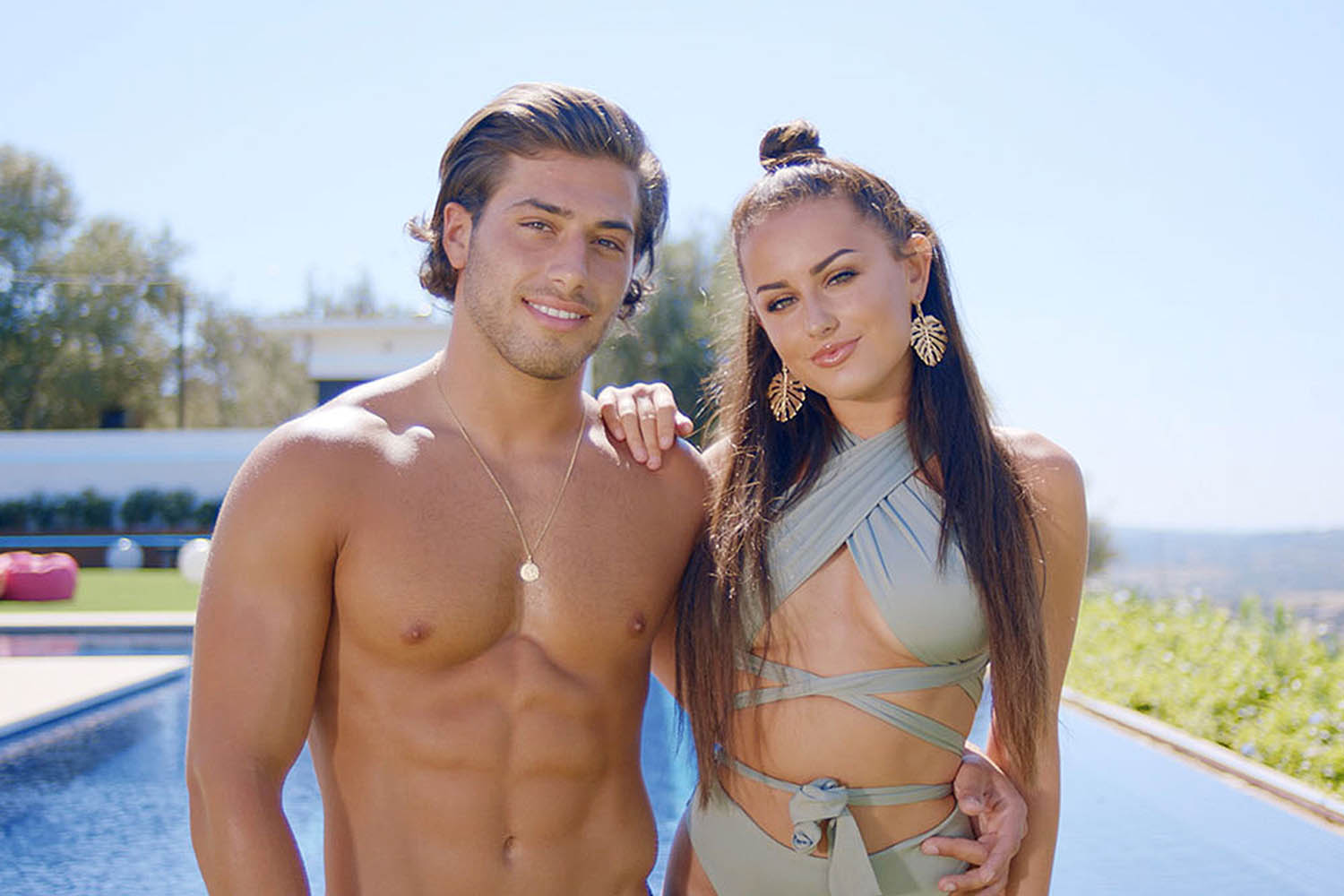
Series three winners Kem Cetinay and Amber Davies
What with the skimpy outfits and high-octane flirting, on the surface, the pitch is that Islanders are defying the oft-observed aversion to love and sex of their own gen Z cohort, but it is becoming increasingly apparent that this is myth.
There have been Love Island marriages and babies, but for the past few series, you suspect that most couples stay together, not even for the chance of the comparatively paltry £50,000 prize money, but for the increased earning power post-Love Island.
Thus, the series could be said to have spawned a new genre of romance: the reality show hook-up. When you think you’re watching airheads, what you’re actually watching is the new wave of the content-provider professional class. Ruthless workaholics in beach shorts and string bikinis.
Observing the new arrivals last week, it seems that the majority of them sense an opportunity – and why not, with life so hard and unemployment so high? Is this the central irony of Love Island – that, for years now, it has launched more careers than genuine romances? That it has arguably evolved into one of the least romantic shows that’s ever been on British television?
And is this Love Island’s essential problem, the real reason behind the falling ratings – that it has become too much about cool-eyed professional opportunism and too little about hot-headed love? That people miss the anarchy, the silliness and the soap opera of the old-style Love Island? Most of all, they miss the Islanders who really did want to fall in love.
Maybe the show doesn’t need a revamp. Maybe it just needs a rest.
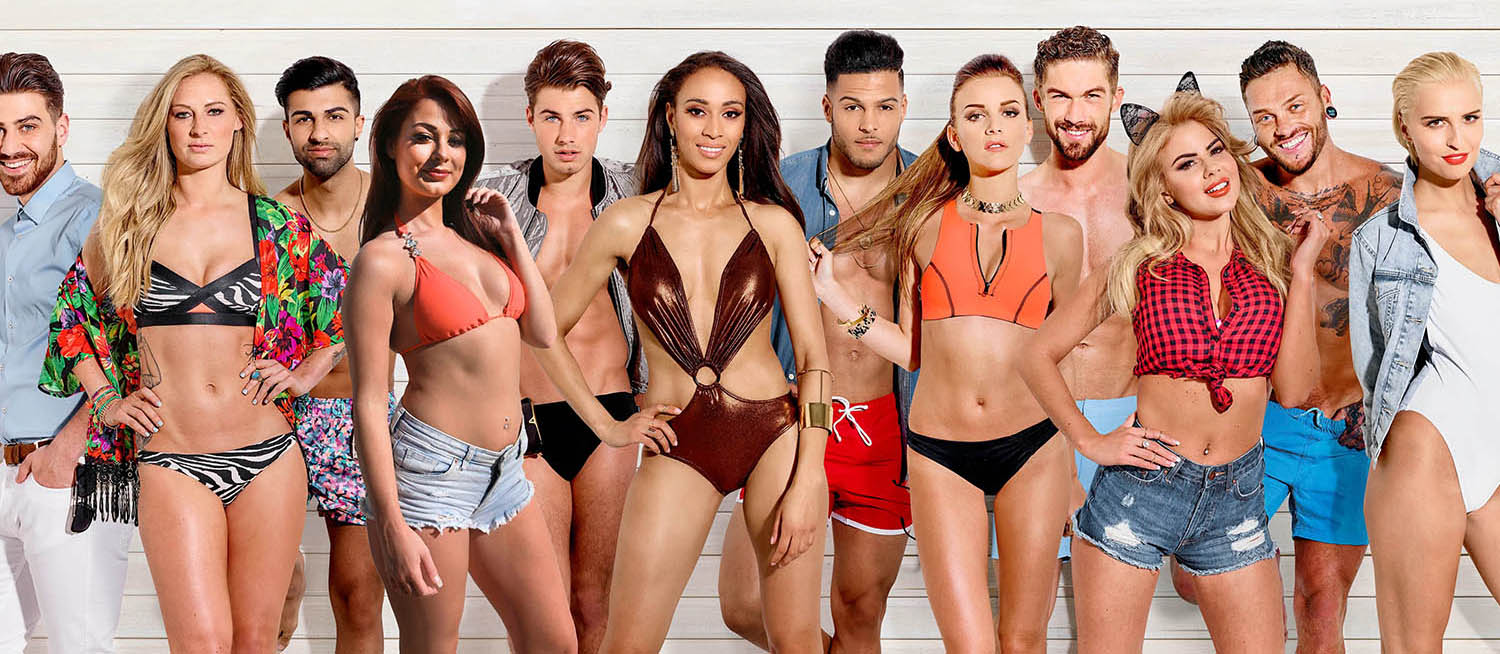
The cast of the first series, which aired in 2015
Love Island glossary
“He has been ignoring me all evening. I think I’ve been pied”
The course of true love is not running smoothly.
“You’re looking like a real peng sort tonight, mate”
Shall I compare thee to a summer’s day?
“I found out they don’t fancy me; it is what it is”
Freedom is not achieved by satisfying desire, but by eliminating it.
“I think I like her; I feel like a proper melt”
The spell of romance can soften the hardest heart.
“They’re single now, so you’re free to crack on”
Time’s winged chariot is hurrying near.
“They just told me they like you. You should shoot your shot”
Gather ye rosebuds, while ye may.
Photographs courtesy ITV

